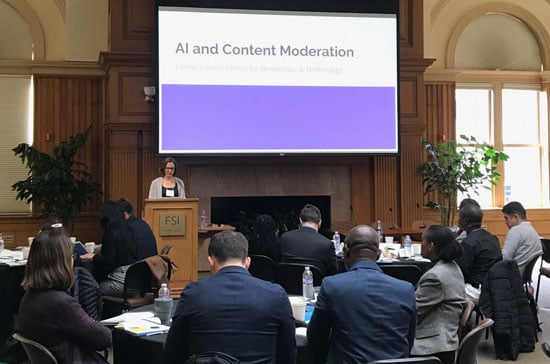Taking a Rights-based Approach to Emerging Technology
Governments and private actors are increasingly reliant on artificial intelligence and digital technologies, which raises concerns for civic freedoms. Technologies, such as facial recognition, have been used to identify and arrest protesters. Meanwhile, the distribution of fake or misleading information online is becoming a widespread tool to harm civil society representatives. To ensure that new technologies support rather than undermine civic freedoms, civil society needs a deeper understanding of how AI and other emerging technologies work.
With this in mind, ICNL partnered with the Global Digital Policy Incubator (GDPi) at Stanford University to host the first-ever Tech Camp for civic space defenders. During the intensive three-day event, twenty-five participants from the Global South met with leading experts, including GDPi’s Executive Director Eileen Donahoe, GDPi Principal Investigator Larry Diamond, and former UN Special Rapporteur for Freedom of Opinion and Expression David Kaye, among others. The group examined technologies from machine-learning to blockchain to discuss how they impact civil society, philanthropy, and civic space.
Participants shared the challenges they face while working toward better public participation and respect for human rights, allowing knowledge to flow both ways. Together, with the high-level speakers, they identified policy responses, research methods, and built lasting connections.
At the Tech Camp, ICNL introduced its Innovation Fund, which awarded ten grants to support participants’ work on digital rights issues in their countries. Transparencia Brasil is training an algorithm to scrape government websites for the use of AI-systems to provide insights on the risks they pose for human rights. SOCH Nepal is creating a model Artificial Intelligence Governance Act through a series of multi-stakeholder workshops. The Zaina Foundation in Tanzania trained 50 women human-rights defenders on digital security to ensure they could safely monitor the October 2020 elections. These projects exemplify practical applications from the knowledge gained at the Camp.

“Digital technologies profoundly impact civic space in both positive and negative ways. The goal of the camp was to help civic space defenders better understand how various emerging technologies work, preparing them to defend against risks and advocate for policies that protect rights.”
Eileen Donahoe, Executive Director, Global Digital Policy Incubator
This story is from our 2019-2020 Annual Report. Each story in the report shows how our partners across the world help protect and, where possible, expand civic space.
Sign up for our newsletters
Sign up